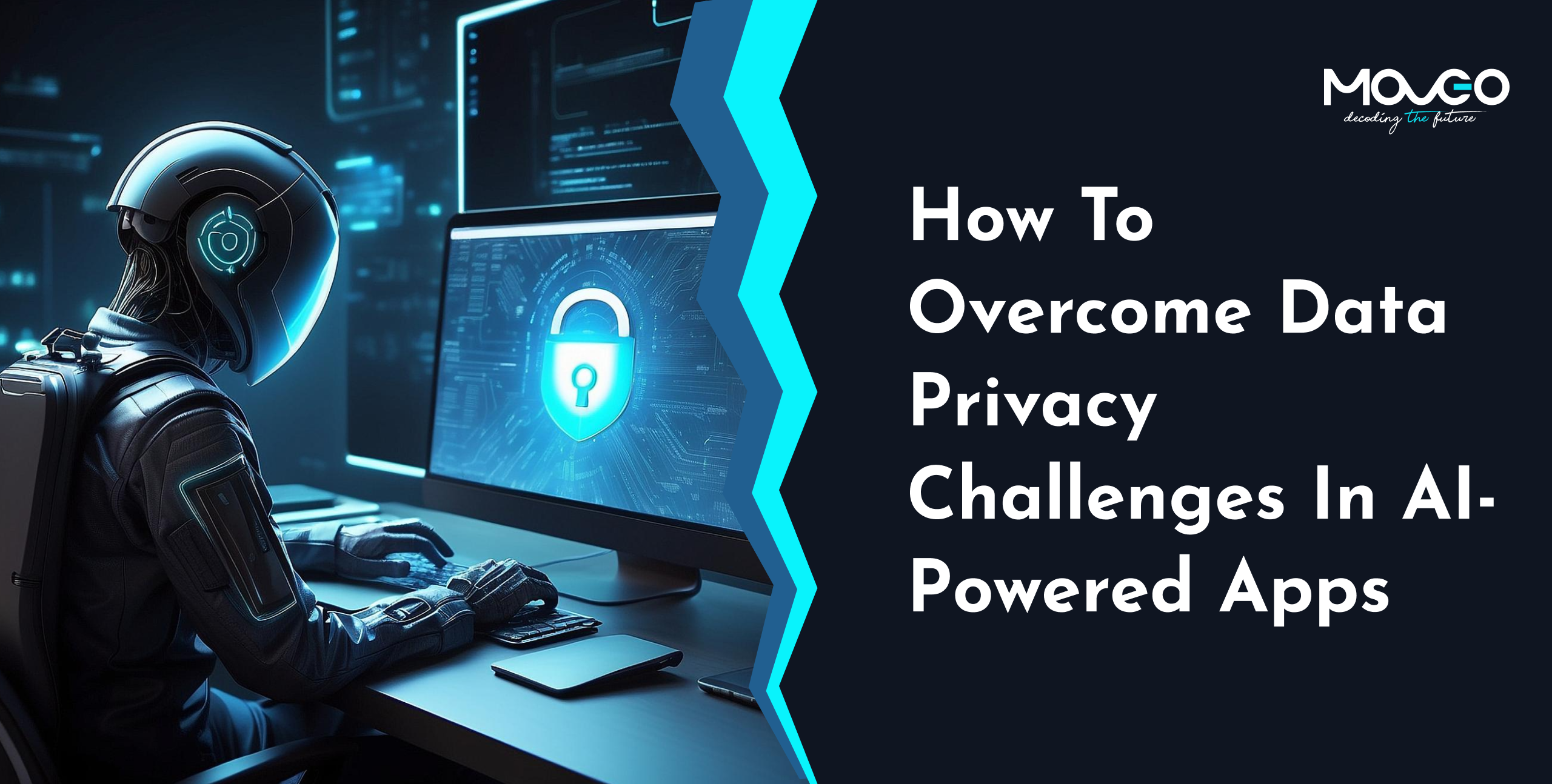AI is changing app development for good. We are moving from segmentation to one-on-one personalization, delivering experiences that evolve and improve with every user interaction.
However, the rapid adoption of artificial intelligence (AI), generative AI (GenAI) and large language models (LLMs) is by-producing a sharp increase in data privacy concerns. Rising concerns over AI and data processing, and increasing incidents of data breaches, demand that developers be meticulous about protecting user data in their AI applications.
AI app developers face a mighty challenge. Without robust data protection practices, even the best AI app can turn into a liability. We use AI in developing all kinds of sensitive apps, like payment apps, healthcare apps, dating apps, and much more, all of which must ensure highest levels of data safety. Responsible AI solutions for healthcare systems are a critical necessity for AI app developers.
Worldwide spending on AI, including AI apps, infrastructure, and related services, is projected to more than double by 2028, reaching $632 billion, according to a forecast by the International Data Corporation (IDC). Of this, the largest share will be that of software and application development.
However, according to a 2023 report from IBM, 43% of organizations have experienced a data breach involving sensitive customer information. Many of these breaches put highly sensitive people at grave risk. Breaches in healthcare, senior centres, banks, and other critical industries pose serious threats on not just cybersecurity but human wellbeing. The need for comprehensive privacy measures is urgent, and AI app developers need to appropriately upskill themselves with the latest technologies in data management and cybersecurity.
Data safety is no longer just a regulatory concern. It is a basic essential of user trust. App developers are expected to prioritize data protection from the first line of code, to maintain credibility and user confidence.
In this post, we’ll explore the critical steps developers need to take to address AI data privacy challenges effectively. From understanding the complexities of data protection in AI applications to implementing robust security measures, we’ll guide you through the essential strategies to ensure your AI app not only complies with regulations but also earns and maintains user trust. We’ll also look at real-world examples of how successful AI apps manage data privacy and the technologies available to help you stay ahead of potential threats.
What is AI App Development?
AI app development involves building applications that utilize artificial intelligence to elevate functionality and user experience. These apps integrate technologies like machine learning (ML), natural language processing (NLP), and computer vision to offer advanced features and personalized services. For instance, Google Assistant helps with tasks like reminders through voice commands, Spotify suggests music based on listening habits, and Snapchat Filters use computer vision to apply real-time AR effects on selfies.
The real power of AI in app development lies in its ability to automate tasks, enhance accuracy, and provide predictive insights, all while delivering a personalized experience. By continuously learning from user data, AI apps can improve over time, making them not only more efficient but also increasingly valuable to users. The security landscape also benefits from AI, as these apps can identify and neutralize threats more quickly. For developers, this means an opportunity to create smarter, more scalable, and cost-effective apps that align with the growing demand for AI-driven innovation across industries.
What is Data Privacy?
Data privacy refers to the protection and management of personal and sensitive information to ensure that individuals’ data is collected, stored, and used responsibly and securely. It encompasses practices and policies designed to prevent unauthorized access, misuse, or disclosure of personal data.
AI apps generate, process, store, and share, vast amounts of data. Data privacy involves implementing robust security measures, ensuring transparency in data practices, and adhering to legal regulations to safeguard individuals’ rights and maintain trust. It is a critical aspect of data management that balances the benefits of data utilization with the need for confidentiality and user control.
Why AI Apps Are Especially Vulnerable to Data Privacy Concerns
When it comes to AI apps, data privacy isn’t just a box to check—it’s a core challenge that’s woven into their very fabric. AI apps are designed to leverage vast amounts of data to offer cutting-edge features, from personalized recommendations to predictive analytics. The result? A treasure trove of personal information is at stake, making AI apps particularly vulnerable to data privacy issues. For instance, when we consider the best AI apps on the Play Store or those leveraging cloud AI platforms, we’re talking about sophisticated systems that process data in ways that can sometimes mask how deeply our personal information is involved.
What makes this even trickier is the evolving nature of AI technology. AI algorithms are constantly learning and adapting, which can inadvertently lead to data privacy concerns if sensitive information isn’t managed carefully. As AI privacy statistics show, the complexity of these systems means that protecting user data requires vigilant, ongoing effort. So, whether you’re developing an AI app or simply using one, understanding these dynamics and staying proactive about data security is crucial for maintaining trust and safeguarding privacy in AI apps.
What is the Responsibility of AI App Developers towards Data Privacy
AI app developers carry a significant responsibility in safeguarding data privacy due to the sensitive nature of the information they handle. Their role extends beyond coding and design, requiring a commitment to ethical practices that protect user data and maintain trust. AI app developers can adopt several key practices to safeguard their users’ data in their app.
- Data Minimization: Collect only the data necessary for the app’s functionality to reduce exposure and potential misuse.
- User Consent: Obtain explicit and informed consent from users before collecting or processing their data, clearly explaining what data is collected and how it will be used.
- Security Measures: Implement robust encryption and security protocols to protect data from unauthorized access and breaches.
- Transparency: Provide clear and accessible information about data handling practices and policies, ensuring users understand how their data is managed.
- Compliance: Adhere to relevant data protection regulations, such as GDPR or CCPA, and stay updated with evolving legal requirements.
- Ethical AI Design: Ensure that AI algorithms are designed to avoid biases and make fair decisions, maintaining the integrity of data use.
- Data Retention: Establish and enforce policies for data retention and deletion, ensuring that data is not kept longer than necessary.
AI Privacy Issues: Real-World Examples and Lessons Learned
AI privacy issues have moved beyond theory, manifesting in real-world cases that serve as cautionary tales for developers. One of the most infamous examples is the Cambridge Analytica scandal, where AI algorithms were used to harvest and exploit personal data from millions of Facebook users without their consent. This case exposed the potential for AI to be weaponized for political manipulation, revealing deep flaws in how data privacy is handled within AI systems. The lack of transparency and user control over personal data led to widespread public outcry and significant legal repercussions.
In 2017, Google’s DeepMind faced scrutiny for sharing 1.6 million patient records without proper consent as part of its project to develop an AI system for detecting acute kidney injuries. The UK’s Information Commissioner’s Office (ICO) found that the data-sharing agreement lacked adequate transparency, leading to a breach of privacy laws.
These incidents highlight the critical need for robust data governance, stringent privacy safeguards, and greater transparency in AI app development. Without these measures, AI systems can easily become sources of data privacy violations, leading to both reputational damage and regulatory penalties for developers.
How to Secure AI Applications Against Data Privacy Risks
Developers must prioritize data security to prevent costly breaches, maintain user trust, and stay compliant with stringent regulations. This requires developers to stay on top of the latest data protection technologies and development best practices.
Implement End-to-End Encryption & Anonymization
End-to-end encryption ensures that data remains protected both during transmission and storage. Advanced standards like AES-256 are non-negotiable if you’re serious about safeguarding user information. But don’t stop there—apply anonymization techniques such as k-anonymity and differential privacy to further remove identifiable information. Homomorphic encryption is another powerful tool, allowing computations on encrypted data without ever decrypting it, keeping data private even during analysis.
Stay Compliant with Data Protection Regulations
Regulations like GDPR and HIPAA compliance aren’t just legal hurdles—they’re frameworks for protecting your users. Conduct regular audits to ensure ongoing compliance and integrate privacy by design in your development process. Performing Data Protection Impact Assessments (DPIAs) helps identify potential risks before they become problems, ensuring that your AI app respects user privacy from day one.
Strengthen Access Control & Authentication
Simple passwords are no longer enough. Multi-factor authentication (MFA) adds an essential layer of security. At the same time, Role-based Access Control (RBAC) and Attribute-based Access Control (ABAC) ensure that only the right people access sensitive data. Secure your API endpoints with tokens or keys to keep unauthorized systems from interacting with your app.
Ensure Data Integrity & Regular Auditing
To maintain trust, your data must remain untampered. Implement data integrity checks using cryptographic tools like checksums and digital signatures. Regular audits and penetration testing can identify weaknesses before attackers do. For added security, blockchain technology offers immutable logs, making any tampering evident and traceable.
Be Prepared with Incident Response & Recovery Plans
Even with the best precautions, breaches can happen. An established Incident Response Plan that includes containment, recovery, and communication steps can make all the difference. Regular drills will ensure that your team is ready to act quickly, minimizing damage. After any incident, a thorough post-analysis can strengthen your defenses for the future.
Future Trends and Considerations in AI Data Privacy
As AI technologies advance, the technologies of data privacy will evolve too. Emerging trends in AI, such as federated learning and differential privacy, will shape the next generation of privacy solutions, offering novel approaches to safeguard sensitive information while leveraging AI’s capabilities.
In the future, developers will need to anticipate and integrate these advanced privacy techniques, ensuring they can effectively counteract new threats and vulnerabilities. The adoption of stronger access controls, sophisticated encryption methods, and dynamic risk assessment models will become crucial in maintaining robust data protection frameworks.
Additionally, as AI systems become more and more autonomous, ensuring transparency and accountability in data handling will grow. Developers must stay abreast of regulatory developments and best practices, adapting their strategies to align with evolving legal and ethical standards. By proactively embracing these advancements and continuously refining privacy practices, AI app developers can better safeguard user data in an ever-evolving technological landscape.
Conclusion
As we become increasingly dependent on AI for everything we do, safeguarding our users’ data privacy has taken on new significance. The future will bring new challenges in AI, but the need to protect data will remain constant. Developers have a crucial role in ensuring that data privacy is prioritized from the start of the app development process. App development companies must invest in compliance, training, and sensitization. All stakeholders must work together to ensure accountability and commitment. By implementing advanced security measures, maintaining transparency, and staying ahead of potential risks, we can create AI applications that not only comply with regulations but also earn and sustain user confidence.


